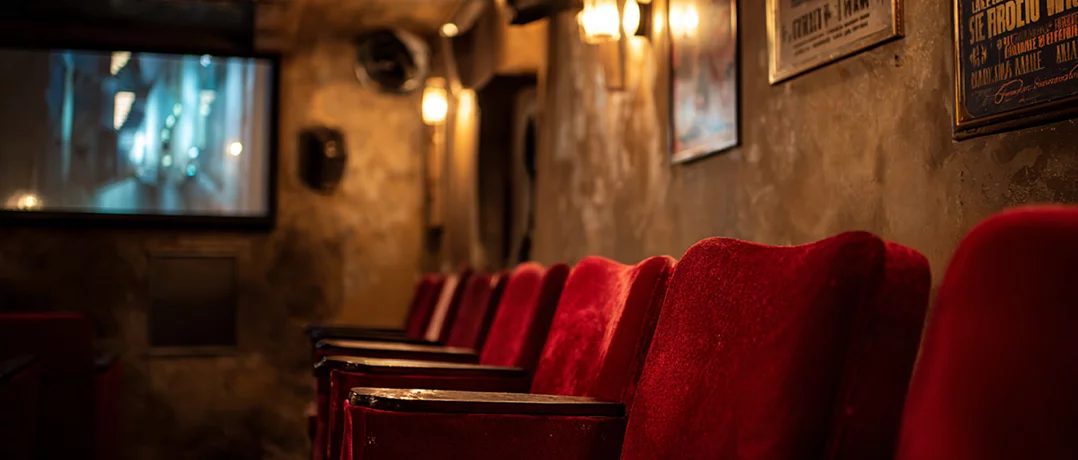With the first Beirut edition of the Lebanon International Short Film Festival, Tiro Arts Association brings regional filmmakers, restored heritage cinemas, and independent voices back to the heart of Hamra.
Hamra on screen: Lebanon International Short Film Festival makes its Beirut debut
Hamra on screen: Lebanon International Short Film Festival makes its Beirut debut

Walking down Hamra these days, you can hear something unusual beneath the hum of taxis and cafés: the sound of a cinema breathing again.
Beirut’s historic Colisée, once shuttered, forgotten, left to dust and memory, is lit up for the first Beirut edition of the Lebanon International Short Film Festival, running November 15–18.
Inside, the red seats are full. Outside, a crowd gathers under the marquee, the kind of scene Beirut hasn’t witnessed in years.
For Kassem Istanbuli, president of the Tiro Arts Association, reviving the Colisée wasn’t just a restoration project. It was a cultural necessity, and the natural next step for a festival that has traveled across Lebanon before finally finding its home in Hamra.
A festival with a long road home
The festival’s story didn’t begin in Beirut.
It began in 2014, in Sour, inside another restored cinema, Alhamra, before expanding to Nabatieh and Tripoli. Each year, each venue, each city carried the same purpose: reviving abandoned cultural spaces and returning cinema to communities that had lost it. “The festival started in 2014, we organized it in Al-Hamra, Nabatieh, and Tripoli,” Istanbuli says. “Now that we opened in the Colisée, we have finally brought it to Beirut. This is the fourth round, but the first full festival here.”
The name itself, Alhamra, carries its own history. When Tiro Arts Association ran the festival in Sour, the old cinema’s architecture inspired the branding. That same inspiration followed them to Beirut. “When we did the festival in Sour, the building was called Alhamra. The design inspired us,” he explains. “Now we have the Colisée in Hamra, Beirut, so we’re doing the festival there.”
A regional gathering in turbulent times
Despite the uncertainty and the familiar Lebanese complications, filmmakers from Oman, the UAE, Iraq, and Egypt have arrived in Beirut, many of them for the first time. Embassies, including Mexico, Argentina, and the Turkish Cultural Center, contributed films as well, turning the Colisée into a crossroads of cinematic voices. “Despite all the circumstances, directors came to Lebanon,” Istanbuli says. “And the winning films from the Sour Cinema Festival of the year are being shown here too.”
Here, politics and borders fade; the films speak louder. Many works in this edition come from conflict-affected regions or communities that rarely find platforms for their stories. Students from the Sharjah Academy of Performing Arts are participating in international events for the first time. “The theme is the voice of cinema, the voice of freedom,” he says.
People who don’t have the opportunity to show their voices can show them here.
The festival becomes more than a screening space, it becomes a microphone.
Restoring cultural life, one cinema at a time
For years, Tiro Arts Association has been quietly reshaping Lebanon’s cultural map. They operate multiple restored cinemas across the country, from Sour to Tripoli to Beirut, a model of decentralizing culture in a place where cultural institutions are often concentrated in one city.
“We have five cinema roles in Lebanon,” Istanbuli explains.
We proved you can make cinema anywhere, and not only permanent cinema.
In the two months leading up to the festival, the Colisée has hosted daily screenings, theater performances, music nights, youth ensembles, and community events. The building has become not just a cinema, but a living cultural hub.
Access for everyone
Tickets are priced at $10 and 5$ for students, but with a policy that feels uniquely, unmistakably Lebanese. “The ticket is not a requirement sometimes,” Istanbuli says. “Anyone who can’t pay, we say welcome.” This edition requires tickets mainly to cover accommodation for international guests, but the doors remain open to all. In Tripoli, the festival was fully free; in Hamra, the ethos stays the same.
This year’s edition also pays tribute to icons of Lebanese cinema and theater: Mounir Maasri, 85, attends in person; the family of Nabiha Abou Al-Hassan gathers to honor her legacy. Audiences can watch daily screenings across two cinema halls, participate in discussions with directors, and discover new independent films, from documentaries to experimental works. “They’ll see the Colisée, the old places revived,” Istanbuli says. “They’ll see the new films in an independent cinema, hear the discussions, meet the directors. Every day, two cinemas for four days.”
Inside the Colisée, the screen glows. Outside, Hamra feels like a cultural boulevard again, restless, curious, alive. It may be a short film festival. But in a city that has forgotten its cinemas, it feels like a long-awaited return.


